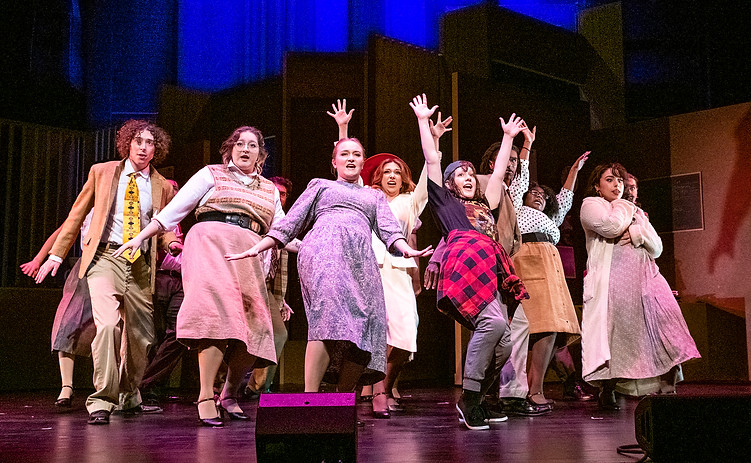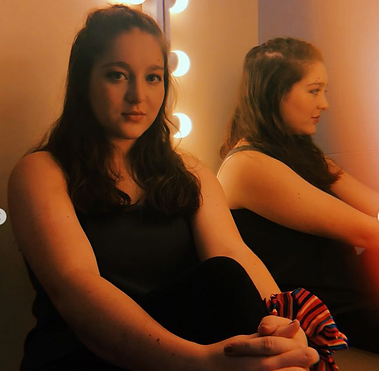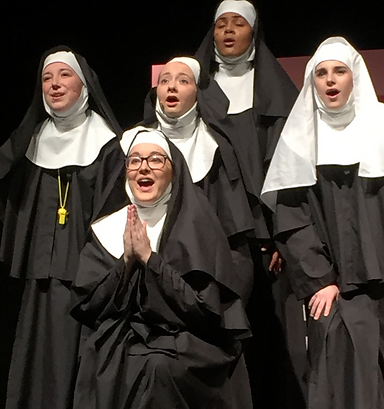Hi there,
I’m Charlotte!
Theatre is a teamwork-based sport, and when you focus on the foundation needed for that sport, respect is at the base of it all.
When I teach, I place teamwork and collaboration above everything else, and I advocate for student exploration and initiative.

Teaching Philosophy

When I started in high school I was repeatedly asked, “What are you going to do when you get to the ‘real world’?” However, there are two questions in that: “What do you want to do?” and “Are you ready for the ‘real world’?”
The first question was easy enough to answer, “Theatre! I’m going to be on Broadway!” This dream was incredibly valid, in theory, but there were other questions I had to follow up with, and by the time I was finishing my first year of college, I wasn’t sure Broadway was where I should be. I started to experience the tech and the professional process of Theatre and I remembered back to my highschool experience. In highschool, we were split into groups: actors, techies and the classroom kids. The classroom kids were just that- kids who came into the class and enjoyed learning about theatre, but never actively pursued it, so all of their exploration started and ended at the classroom’s door. The techies and the actors were both sides of the same coin: we all enjoyed doing theatre outside of class, and were a part of both preparing the sets and the costumes for the show, but on the actual performances the techies stayed offstage. As one of the people in the class who liked to help out everywhere. So, I started to learn the sound and lighting boards, how to use the headsets and hang lights, how to categorize the costume room and how to sew new clothing for shows, all while being a character in the show myself! I loved every aspect of theatre, and I loved seeing it come together into one beautiful performance at the end. Furthermore, I loved how everything in our department was made and run by students, giving us first-hand experience on how our initiatives and our active participation helped to complete the show.
During college, I started to work at a Montessori school, where students that attended could be as young as 18 months or as old as 15. While working in the Toddler Classroom, I also began teaching Drama to the Adolescent students (ages 11-15). Working with the Adolescent students, we would prepare both a small piece-by-piece performance and then in the spring, an entire play. The kids in the Adolescent classroom were always ready to be given a task, and were more than likely already actively working on something. This is something I appreciate about the Montessori Methodology, it promotes children being an active and engaged student as a pillar of their learning. If they are best at math, then they will work on math, while the teachers supply the rest of the needed material. In theatre, I had kids who would rather paint the sets than be on stage, so while I was blocking scenes, the rest of the kids would be building set pieces, or painting, or creating props, all of which were from their own design. By letting the students explore what they actively wanted to work on, we were able to spread out our separate talents into parts that aided the show as a whole. Furthermore, by letting the student’s pick the parts they were interested in, the results were even more impressive in the end, all fueled by the passion and interest that they were exploring from.
Along with working at Mountainside Montessori, I was also working with the drama department at my previous high school. I was hired to choreograph their mainstage musicals as well as provide professional-level dance workshops. At one of these workshops, we were discussing what we would like to explore in theatre, if we were to pursue it in the future. One of the student’s made a joke saying, “They don’t need game design in theatre, so I’m not needed!” This made me realize that a lot of theatre students don't understand how almost everything that they learn can be applied to theatre. Things like woodshop, coding, graphic design, creative writing, animal care, gardening, sports, cosmetology, fashion design or cosplay, advertising or social media, financial management, almost everything they either learn in school, or become interested in outside of school, can be applied to theatre. I asked the student what kinds of games they designed, and they replied, “landscape creation”. Over the next two days I had them come up with a set/scenic design presentation for the show that we were learning choreography for, and to show in it two or three scenes from the show. Doing that side project with that student was so incredible for me, bringing someone who was a passive artist into an active member of the production, by including things that they already enjoyed.
When I come into a classroom, I want to find ways to engage with students from their personal experiences and interests. Not everyone can see themselves on stage speaking to a large audience, but that doesn’t mean that they don’t have a valid place in the theatre. By exploring the tech, production and creation side of theatre, we are opening our world to more than just actors.
Now I had answered “What do you want to be?”, but I still had, “Are you ready for the ‘real world’?” to answer. I remember in highschool being told, “in the real world they won’t/will…” as a way to scare me into doing something- as if I wasn’t already living in the real world. The ‘real world’ happens everywhere, and the more that we tell our students that they are not a part of it, the more we are alienating them from it. When I teach, I want to show students tools and skills they can use in a professional production, so that they are able to practice it before graduating highschool. There were some theatre protocols that I was not taught prior entering college and it put me behind when I arrived. These included: safety protocols, etiquette for crew and cast, and common terms or practices that everyone in the theatre world should know. Not only do I want to give my students the benefits of learning these things, but I also want them to be a well-rounded member of the dramatic community, being able to step in wherever needed.
A show cannot go on without lights, costumes, sounds, sets, an audience, advertisements, directors, stage managers, backstage crew, hair and makeup crew, follow spots, script writers, actors, dancers and even ushers. I want my students to have experience working in some, or all, of these positions so that they know what is expected of them in a variety of roles, and what they should expect from others while in those roles. Stepping into “someone else’s shoes” is the keystone of all teamwork-centric projects, and theatre is the biggest one of all. Theatre teaches us how to communicate, how to compromise, how to collaborate and how to be a community in such a way that sports or classrooms cannot. Theatre is a team sport, and without respect, there is no team. When I teach my students, I base all my learning on respect and building upwards. That is what the ‘real world’ is, learning how to give and receive/achieve respect and how to maintain that foundation throughout everything you do.
I became a drama teacher not only to teach students how to be artists and creators, but how to become the best human beings they can be: through active learning, initiating exploration and learning respect. So, when someone asks them, "What are you going to do in the 'real world'?", they can confidently tell them they have been in the 'real world' all along.


